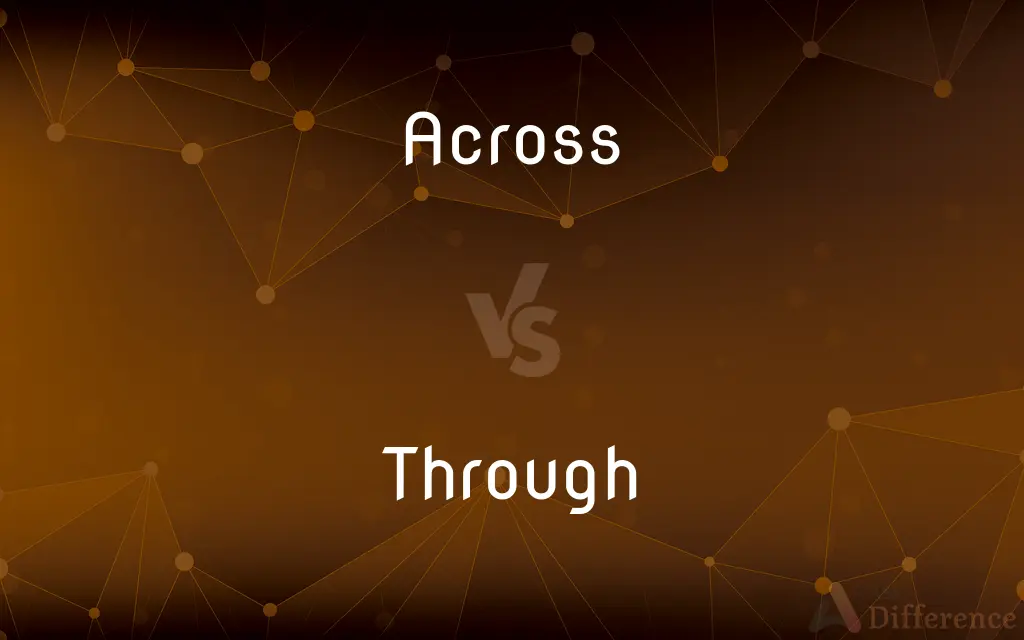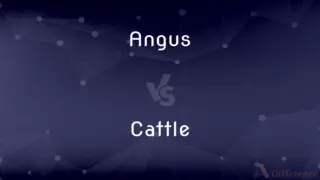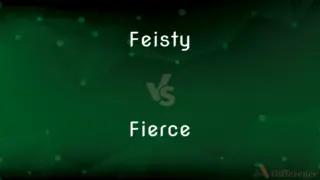Across vs. Through — What's the Difference?
By Urooj Arif & Maham Liaqat — Updated on April 14, 2024
"Across" refers to movement from one side to another over a surface, suggesting a direct or horizontal traversal, while "through" implies movement from one end to the other within something, involving a more encompassing or penetrating path.

Difference Between Across and Through
Table of Contents
ADVERTISEMENT
Key Differences
"Across" is used to describe movement over the surface of something, often implying a clear, direct path over a relatively flat area. On the other hand, "through" describes movement that starts outside an object or area, passes into and comes out from the other side, indicating a passage that cuts internally.
When using "across," the focus is typically on the breadth of an area or surface being traversed, such as walking across a bridge. Whereas, "through" is used when the focus is on the depth or interior of the space being navigated, like driving through a tunnel.
In terms of visualization, "across" tends to be associated with open, visible landscapes or surfaces, where the start and endpoint are generally visible. Conversely, "through" evokes images of enclosed or semi-enclosed spaces where the pathway involves immersion in an environment or medium.
"Across" often implies a relatively shorter or simpler journey with minimal obstacles on the surface, ideal for descriptions of crossing streets or fields. In contrast, "through" suggests a journey that might involve complexity or obstacles, as it requires moving amidst or inside of something, such as going through a forest.
The preposition "across" is appropriate for actions that involve skimming or being superficially on top of another object, like spreading butter across bread. Meanwhile, "through" is apt for actions that involve penetration or movement within the bounds of an object, such as seeing through a window.
ADVERTISEMENT
Comparison Chart
Spatial Relation
Over the surface, horizontally
From one side out the other, internally
Typical Usage
Open spaces, clear paths
Enclosed spaces, immersive environments
Focus
Breadth and surface
Depth and penetration
Example Contexts
Bridges, fields, rooms
Tunnels, forests, crowds
Connotation
Surface traversal, visibility of path
Depth traversal, potential obstacles
Compare with Definitions
Across
Reaching or referring to the opposite side.
The grocery store is located across the street.
Through
Enclosed or surrounded by something while moving.
They walked through the crowded market.
Across
Extending from one side to another.
A beautiful rainbow stretched across the sky.
Through
A path that involves penetrating or being immersed.
The light shone through the curtains.
Across
Path or direction that is visible or clear.
He could see the path leading straight across the field.
Through
Entering one side and coming out from the other.
The road goes through the forest and emerges by the lake.
Across
Movement that involves passing over without depth.
She skimmed her fingers across the water.
Through
Movement via or within a medium or channel.
They communicated through email.
Across
Moving from one side to another on a surface.
The cat ran swiftly across the roof.
Through
Progressing despite obstacles or challenges.
She persevered through the difficulties.
Across
On, at, or from the other side of
Across the street.
Through
In one side and out the opposite or another side of
Went through the tunnel.
Across
So as to cross; through
Drew lines across the paper.
Through
Among or between; in the midst of
A walk through the flowers.
Across
From one side of to the other
A bridge across a river.
Through
By way of
Climbed in through the window.
Across
Into contact with
Came across my old roommate.
Through
By the means or agency of
Bought the antique vase through a dealer.
Across
From one side to the other
The footbridge swayed when I ran across.
Through
Into and out of the handling, care, processing, modification, or consideration of
Her application went through our office. Run the figures through the computer.
Across
On or to the opposite side
We came across by ferry.
Through
Here and there in; around
A tour through France.
Across
Crosswise; crossed.
Through
From the beginning to the end of
Stayed up through the night.
Across
In such a manner as to be comprehensible, acceptable, or successful
Put our idea across.
Get a message across.
Through
At or to the end of; done or finished with, especially successfully
We are through the initial testing period.
Across
Being in a crossed position
Seated with arms across.
Through
Up to and including
A play that runs through December.
A volume that covers A through D.
Across
To, toward, or from the far side of (something that lies between two points of interest).
We rowed across the river.
Fortunately, there was a bridge across the river.
He came across the street to meet me.
Through
Past and without stopping for
Drove through a red light.
Across
On the opposite side of (something that lies between two points of interest).
That store is across the street.
Through
Because of; on account of
She succeeded through hard work. He declined the honor through modesty.
Across
Across from: on the opposite side, relative to something that lies between, from (a point of interest).
Through
From one end or side to another or an opposite end or side
Opened the door and went through.
Across
From one side to the other within (a space being traversed).
The meteor streaked across the sky.
He walked across the room.
Could you slide that across the table to me, please?
Through
From beginning to end; completely
I read the article once through.
Across
At or near the far end of (a space).
Through
Throughout the whole extent or thickness; thoroughly
Warmed the leftovers clear through.
Got soaked through in the rain.
A letter that was shot through with the writer's personality.
Across
Spanning.
This poetry speaks across the centuries.
Through
Over the total distance; all the way
Drove through to their final destination.
Across
Throughout.
All across the country, voters were communicating their representatives.
Through
To a conclusion or an accomplishment
See a matter through.
Across
So as to intersect or pass through or over at an angle.
Lay the top stick across the bottom one.
She had straps fastened across the conduit every six feet.
Through
Allowing continuous passage; unobstructed
A through street.
Across
In possession of full, up-to-date information about; abreast of.
Through
Affording transportation to a destination with few or no stops and no transfers
A through bus.
A through ticket.
Across
From one side to the other.
She helped the blind man across;
The river is half a mile across
Through
Continuing on a highway without exiting
Through traffic.
Through lanes.
Across
On the other side.
If we sail off at noon, when will we be across?
Through
Passing or extending from one end, side, or surface to another
A through beam.
Across
In a particular direction.
He leaned across for a book.
Through
Having finished; at completion
She was through with the project.
Across
(crosswords) Horizontally.
I got stuck on 4 across.
Through
Having no further concern, dealings, or connection
I'm through with him.
Across
A word that runs horizontally in the completed puzzle grid or its associated clue.
I solved all of the acrosses, but then got stuck on 3 down.
Through
Having no more use, value, or potential; washed-up
That swimmer is through as an athlete.
Across
From side to side; athwart; crosswise, or in a direction opposed to the length; quite over; as, a bridge laid across a river.
Through
Doomed to death or destruction.
Across
From side to side; crosswise; as, with arms folded across.
Through
From one side of an opening to the other.
I went through the window.
Across
Obliquely; athwart; amiss; awry.
The squint-eyed Pharisees look across at all the actions of Christ.
Through
Entering, then later leaving.
I drove through the town at top speed without looking left or right.
Across
Placed crosswise;
Spoken with a straight face but crossed fingers
Crossed forks
Seated with arms across
Through
Surrounded by (while moving).
We slogged through the mud for hours before turning back and giving up.
Across
To the opposite side;
The football field was 300 feet across
Through
By means of.
This team believes in winning through intimidation.
Across
In such a manner as to be understood and accepted;
She cannot get her ideas across
Through
In consequence of; as a result of.
Across
Transversely;
The marble slabs were cut across
Through
(North America) To (or up to) and including, with all intermediate values.
From 1945 through 1991;
The numbers 1 through 9;
Your membership is active through March 15, 2013
Through
Passing from one side of something to the other.
Interstate highways form a nationwide system of through roads.
Through
Finished; complete.
They were through with laying the subroof by noon.
Through
Without a future; done for.
After being implicated in the scandal, he was through as an executive in financial services.
Through
No longer interested; wearied or turned off by experience.
She was through with him.
Through
Proceeding from origin to destination without delay due to change of equipment.
The through flight through Memphis was the fastest.
Through
(association football) In possession of the ball beyond the last line of defence but not necessarily the goalkeeper; through on goal.
Through
From one side to the other by way of the interior.
The arrow went straight through.
Through
From one end to the other.
Others slept; he worked straight through.
She read the letter through.
Through
During a period of time; throughout
He worked through the night.
Through
To the end.
He said he would see it through.
Through
Completely.
Leave the yarn in the dye overnight so the color soaks through.
Through
Out into the open.
The American army broke through at Saint-Lô.
Through
A large slab of stone laid in a dry-stone wall from one side to the other; a perpend.
Through
(obsolete) A coffin, sarcophagus or tomb of stone; a large slab of stone laid on a tomb.
Through
From end to end of, or from side to side of; from one surface or limit of, to the opposite; into and out of at the opposite, or at another, point; as, to bore through a piece of timber, or through a board; a ball passes through the side of a ship.
Through
Between the sides or walls of; within; as, to pass through a door; to go through an avenue.
Through the gate of ivory he dismissedHis valiant offspring.
Through
By means of; by the agency of.
Through these hands this science has passed with great applause.
Material things are presented only through their senses.
Through
Over the whole surface or extent of; as, to ride through the country; to look through an account.
Through
Among or in the midst of; - used to denote passage; as, a fish swims through the water; the light glimmers through a thicket.
Through
From the beginning to the end of; to the end or conclusion of; as, through life; through the year.
Through
From one end or side to the other; as, to pierce a thing through.
Through
From beginning to end; as, to read a letter through.
Through
To the end; to a conclusion; to the ultimate purpose; as, to carry a project through.
Through
Going or extending through; going, extending, or serving from the beginning to the end; thorough; complete; as, a through line; a through ticket; a through train. Also, admitting of passage through; as, a through bridge.
Through
Having finished or arrived at completion;
Certain to make history before he's done
It's a done deed
After the treatment, the patient is through except for follow-up
Almost through with his studies
Through
Of a route or journey etc.; continuing without requiring stops or changes;
A through street
A through bus
Through traffic
Through
From one end or side to the other;
Jealousy pierced her through
Through
From beginning to end;
Read this book through
Through
Over the whole distance;
This bus goes through to New York
Through
To completion;
Think this through very carefully!
Through
In diameter;
This cylinder measures 15 inches through
Through
Throughout the entire extent;
Got soaked through in the rain
I'm frozen through
A letter shot through with the writer's personality
Knew him through and through
Boards rotten through and through
Common Curiosities
What is the difference between moving across a park and through a park?
Moving across a park suggests a direct path over the surface, likely a shorter and visible route, while moving through a park suggests a longer, more involved path possibly surrounded by trees or paths within the park.
Is it correct to say "walked across the tunnel" instead of "walked through the tunnel"?
It is more appropriate to say "walked through the tunnel," as it involves moving inside and coming out the other side, whereas "across" would incorrectly suggest walking over it.
Can "through" imply a longer duration than "across"?
Yes, "through" often implies a longer duration because it involves depth or obstacles, unlike the more superficial and direct "across".
How do "across" and "through" apply to abstract concepts?
"Across" can refer to a broad, general coverage, such as reading across topics, while "through" might mean a detailed and thorough examination, such as working through problems.
What metaphors might use "across" and "through"?
"Across" could be used in metaphors about overcoming visible, superficial challenges (e.g., "getting your message across"), while "through" might be used for enduring or penetrating deeper challenges (e.g., "getting through tough times").
Can "across" and "through" be used interchangeably in any context?
Generally, they are not interchangeable due to their distinct implications about the nature of the movement or journey. "Across" implies a surface-level transition, while "through" implies a more in-depth passage, often within something.
What impact does each preposition have on the sense of difficulty in a journey?
"Across" might imply a lesser sense of difficulty, associated with clear and open paths. In contrast, "through" often conveys a greater sense of challenge, as it suggests navigating internal complexities or barriers within an enclosed space.
How do "across" and "through" convey the user's perspective or relationship to space?
"Across" conveys a perspective of detachment or overview, as if observing from above or at a distance. "Through" conveys a more immersive or enveloped experience, suggesting closeness and direct engagement with the environment.
How do the prepositions affect the perception of movement in writing?
"Across" suggests quickness and ease, suitable for lighter, more visible scenarios. "Through" suggests a more substantial, possibly challenging experience, suitable for conveying depth and complexity.
What role do these prepositions play in technical writing or instructions?
In technical writing or instructions, precision is key. "Across" is used when instructing movements or alignments that span surfaces or areas (e.g., drawing a line across a graph). "Through" is used to describe processes that involve sequences or steps that must be followed within systems or components (e.g., routing wiring through a conduit), emphasizing progression or depth in the instructions.
How does the use of "across" and "through" change in geographical contexts?
In geographical contexts, "across" often describes movement over a specific area like a desert or a continent (e.g., traveling across Asia), suggesting a broad, expansive journey. "Through" typically describes a journey that involves entering and exiting geographical features like mountains or forests (e.g., hiking through the Rockies), emphasizing traversal within or enclosed by these features.
Share Your Discovery

Previous Comparison
Angus vs. Cattle
Next Comparison
Feisty vs. FierceAuthor Spotlight
Written by
Urooj ArifUrooj is a skilled content writer at Ask Difference, known for her exceptional ability to simplify complex topics into engaging and informative content. With a passion for research and a flair for clear, concise writing, she consistently delivers articles that resonate with our diverse audience.
Co-written by
Maham Liaqat













































